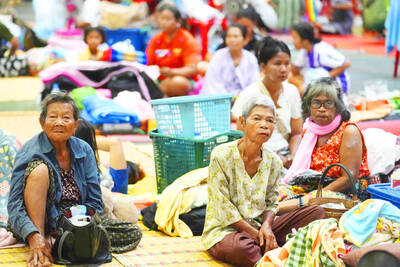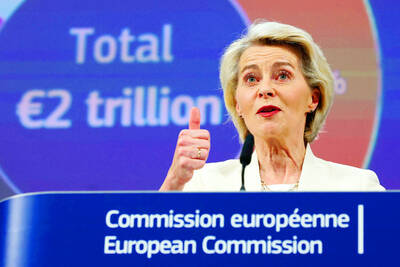Indonesia endured decades of bloodshed during former president Suharto's dictatorship. Yet, in an era when ruthless leaders are increasingly being held accountable, he has eased comfortably into old age without so much as a day in court.
The former dictator has been shielded since his May 1998 ouster by a graft-ridden legal system, government leaders who became wealthy during his 32-year rule and top military loyalists who want to clear his name.
Concerns about his mental and physical health too have kept him from facing trial: A series of strokes in recent years have left Suharto with permanent brain damage and impaired speech.
There is also a foreign hesitance to push justice in a fragile democracy that is a US ally in the fight against terrorism.
Between 300,000 and 800,000 alleged communist sympathizers were killed during Suharto's bloody rise to power from 1965 to 1968, a spasm of violence led by the Indonesian army and conservative Muslim groups.
His troops killed another 300,000 in military operations against independence movements in Papua, Aceh and East Timor, while hundreds of thousands of others were jailed without trial or disappeared.
Indonesian President Susilo Bambang Yudhoyono, once a general serving under Suharto, is among a stream of high-profile government officials who have flocked to the hospital to visit the former strongman, who is suffering from multiple organ failure and a potentially deadly blood infection.
"As a human being, like other leaders, certainly he made mistakes and committed wrongdoing, but it would not hurt us to thank him and appreciate his achievements and services to the country," Yudhoyono said on Saturday.
In the past, concerns about instability in the vast and ethnically diverse archipelagic nation have been cited as reasons not to prosecute the retired five-star general.
Some believed that reopening wounds of the past "might yield a similar meltdown" to that of the former Yugoslav federation, which broke apart in a series of wars in the 1990s after the death of strongman Josip Broz Tito, said Mark Drumbl, director of the Transnational Law Institute at Washington and Lee University in Virginia.
There also were fears his testimony would implicate multinational corporations and foreign governments "that were only too content to do business with him, support him, and make huge profits out of Indonesia's vast natural resources," he said.
Transparency International, a financial watchdog, estimates Suharto and his family amassed as much as US$35 billion during his reign, with his six children and inner circle becoming fabulously wealthy running state enterprises.
Efforts to recover the money have failed, and only one civil case is pending.
Yudhoyono sent the attorney general to the hospital this week to offer the family an out-of-court settlement for a US$1.5 billion suit, seeking to avoid a potentially embarrassing public trial. Defense lawyers rejected the proposal, denying accusations of wrongdoing.
Only one member of Suharto's family has ever served time in jail -- his youngest son, Tommy -- for ordering the murder of a Supreme Court judge who had convicted him of graft.
He was released in 2006 after spending just one-third of his 15-year sentence in a private air-conditioned cell.
Some critics say Indonesia's judicial system is so crippled by corruption that an international tribunal is needed to address past atrocities.
"If some Suharto family member needs to buy off a judge ... that's easy for them to do," said William Liddle, an Indonesia expert at Ohio State University. "Virtually all court decisions in this country are bought."
There is enough evidence against Suharto to try him under international law for crimes against humanity and genocide, said Richard Tanter, a professor of international relations and the Royal Melbourne Institute of Technology.
Late Serbian President Slobodan Milosevic died in UN custody while on trial for war crimes and genocide; Chile's General Augusto Pinochet was facing human rights abuse allegations when he died at age 91; proceedings are under way against Liberia's ex-President Charles Taylor; and Cambodia is prosecuting Khmer Rouge leaders for the killing fields.
But previous calls that Suharto be tried for graft and rights abuses have all but died away in the wake of his illness, with even his fiercest critics in the predominantly Muslim country saying this is the time to forgive.
"The idea of pursuing old, sick men is unattractive, but the basic deterrence function of such prosecutions largely outweighs" any drawbacks, Tanter countered. "For the ghosts of all the slaughtered and tortured, I'd like to see justice."

FOREST SITE: A rescue helicopter spotted the burning fuselage of the plane in a forested area, with rescue personnel saying they saw no evidence of survivors A passenger plane carrying nearly 50 people crashed yesterday in a remote spot in Russia’s far eastern region of Amur, with no immediate signs of survivors, authorities said. The aircraft, a twin-propeller Antonov-24 operated by Angara Airlines, was headed to the town of Tynda from the city of Blagoveshchensk when it disappeared from radar at about 1pm. A rescue helicopter later spotted the burning fuselage of the plane on a forested mountain slope about 16km from Tynda. Videos published by Russian investigators showed what appeared to be columns of smoke billowing from the wreckage of the plane in a dense, forested area. Rescuers in

Philippine President Ferdinand Marcos Jr is to meet US President Donald Trump this week, hoping Manila’s status as a key Asian ally would secure a more favorable trade deal before the deadline on Friday next week. Marcos would be the first Southeast Asian leader to meet Trump in his second term. Trump has already struck trade deals with two of Manila’s regional partners, Vietnam and Indonesia, driving tough bargains in trade talks even with close allies that Washington needs to keep onside in its strategic rivalry with China. “I expect our discussions to focus on security and defense, of course, but also

POINTING FINGERS: The two countries have accused each other of firing first, with Bangkok accusing Phnom Penh of targeting civilian infrastructure, including a hospital Thai acting Prime Minister Phumtham Wechayachai yesterday warned that cross-border clashes with Cambodia that have uprooted more than 130,000 people “could develop into war,” as the countries traded deadly strikes for a second day. A long-running border dispute erupted into intense fighting with jets, artillery, tanks and ground troops on Thursday, and the UN Security Council was set to hold an emergency meeting on the crisis yesterday. A steady thump of artillery strikes could be heard from the Cambodian side of the border, where the province of Oddar Meanchey reported that one civilian — a 70-year-old man — had been killed and

‘OPPORTUNITY TO ENGAGE’: Antonio Costa and Ursula von der Leyen are to meet Chinese President Xi Jinping to discuss EU-China relations and geopolitical challenges Top leaders from China and the EU are to hold a summit in Beijing this week, as the major economic powers seek to smooth over disputes ranging from trade to the Ukraine conflict. Beijing and Brussels have been gearing up to mark the 50th anniversary of the establishment of diplomatic ties, but a suite of squabbles over state subsidies, market access and wartime sanctions have dampened the festivities. A spokesperson for the Chinese Ministry of Foreign Affairs yesterday confirmed that European Council President Antonio Costa and European Commission President Ursula von der Leyen would visit on Thursday. The statement came after the EU